Schlagwort: ‘Medicine’
My practical year in Montpellier
- Medicine
- France, Montpellier
- Centre Hospitalier Universitaire (CHU) de Montpellier
- 07/2024 – 10/2024
1. Application/Finding an Internship
From an early stage, it was clear to me that I wanted to complete a substantial part of my practical year, my medical internship, abroad. After planning my first rotation in Dubai and having my second in Germany, I wanted to see and experience something different for my third rotation. I chose to take another challenge: general surgery in Montpellier, Southern France. The application process was relatively straightforward; I sent an email to the head of the department in early 2024, and my application was quickly accepted. Further organization was handled through the universities in France and Germany. The process in France was similar to that in Germany, requiring vaccination records, certain health tests, and proof of insurance. Thanks to EU agreements, I didn’t have to worry about obtaining a visa.
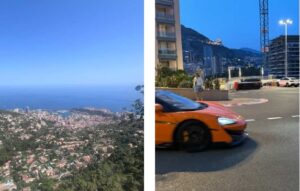
Monaco (left) and the Fairmont Hairpin Curve (right) ©Julia-Laura Schulz
Further planning included my travel arrangements and accommodation. I combined my journey with my family as a little road trip through Switzerland, Italy, and Monaco. For accommodation, I recommend student dormitories, but it is important to note that not all of them accept short-term stays, especially those that span multiple semesters. While I found it easy to secure accommodation for the semester holidays at the start of my internship, I had to move at the beginning of the new semester. Finding new accommodation was quite stressful and not easy, given my work routine and studies. However, in the end, everything worked out.
2. Accommodation & Living Expenses
During my internship, I opted for student housing, which offered a more affordable living option compared to private apartments. The costs for living in Montpellier were manageable, especially considering the financial support I received. I found that groceries were reasonably priced, but dining out could become expensive.
The student dormitories offered essential amenities, such as kitchen facilities, allowing me to cook my own meals, which helped keep my expenses down. While I didn’t strictly budget, I was mindful of my spending since I also wanted to indulge in the local cuisine and travel during my free time. Overall, Montpellier is a vibrant city, and the cost of living was reasonable for a student lifestyle.
3. Everyday Life/The Internship
On the first day of my internship, I registered at the medical faculty next to the hospital, where I enrolled alongside other Erasmus students. I then went directly to the General, Visceral, and Transplant Surgery department, known as “Chirurgie B.” The senior physician responsible for externes showed me around the unit and explained the processes. In France, medical students are referred to as “externes,” while resident doctors are called “internes,” which can be confusing at first, as “interns” in English usually refers to final-year medical students. Our team typically consisted of three German and two French students. The French externes usually rotate every few weeks, which allowed me to meet many different people.
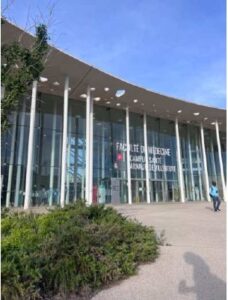
Faculty of Medicine ©Julia-Laura Schulz
Each week, we were assigned to a department, which could include the ward, the operating room, or outpatient clinics. Depending on our interests, we also had the opportunity to rotate through radiology, endoscopy, and anesthesia. Additionally, we had one to two on-call shifts each week (including weekends) for liver transplants. A typical day began with the morning handover from the night shift and a round of visits to all patients on both the general and intensive care wards. After the handover, everyone focused on their own tasks. Once a week, usually on Fridays, there were classes for students, often in the form of OSCE exercises. These sessions were highly educational, although the language barrier sometimes created a tense, exam-like environment. After the classes, the entire team would gather to review and discuss the surgical schedule for the upcoming week, deliberating on various cases. During these discussions, both attending and senior physicians often posed questions to both internes and externes. Additionally, once a month, the internes gave presentations, which were followed by the big weekly rounds.
The general ward was structured similarly to those in Germany, consisting of double and single rooms. The intensive care unit primarily had single rooms, and the operating rooms were comparably designed. Access to various areas of the hospital was secured with access codes. Both internes and externes had a dedicated room on the ward equipped with computers and lockers. All externes received a personal account for the duration of their stay to access computers and the hospital information system.
A particular highlight in Chirurgie B were the liver transplants. During the 24-hour on-call shifts, the ones on-call were responsible for these procedures and had to be prepared to stand in the operating room for about eight hours straight. There was also the opportunity to voluntarily participate in organ retrieval, which often involved traveling to different locations or even flying by private jet. On one occasion, we were escorted by the police, which felt like a movie and was incredibly exciting. The retrieval process is very moving and deeply impressive, as it represents the final and selfless act of brain-dead patients. After retrieval, the liver is transported in a cooled state and appears gray; however, after several hours of surgery and restoration of blood flow, it regains its dark red color. This moment is magical and makes all worries, back pain, and fatigue fade away.
One challenging aspect was the work environment in the department. There was often a tense atmosphere among the resident doctors, which sometimes affected us externes. This led to conflicts between internes and externes, causing misunderstandings with the attending physicians and resulting in stricter oversight. However, thanks to the camaraderie among the externes, this was manageable.
I also wanted to gain insight into neurosurgery, so I contacted the chief physician, who invited me to observe a particularly interesting procedure: an awake brain surgery. The patient underwent head surgery and was awakened for about an hour during the procedure with the assistance of neuropsychologists, who guided her to perform various tasks in order to minimize the risks associated with the surgery. Since I have a strong interest in neurosurgery, this was definitely one of my personal highlights at the clinic.
Despite the initial language barrier and different dialects, I quickly settled in and was able to learn a lot. I observed procedures that I had only previously studied in theory. The awake surgery and the liver transplants were undoubtedly extraordinary experiences that left a lasting impression on me. I would like to extend a special thank you to my colleagues, whose support made the stress of the internship much more bearable. Moreover, the opportunity to forge international connections and broaden my horizons was particularly valuable.
4. Free Time/Tips
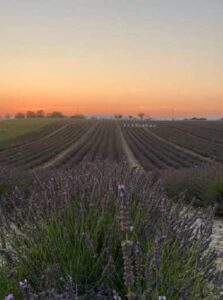
Lavender Fields, Provence ©Julia-Laura Schulz
From the beginning, I met many nice people. After work, we often arranged to meet for dinner, take weekend trips, go canoeing, or even play mini-golf together. A particularly memorable trip was to the lavender fields in Provence, which were breathtakingly beautiful. Watching the Euro football matches together was another unforgettable experience 4 especially the public viewing when France was playing, which created an incredible, lively atmosphere. We also went on trips with the Erasmus group, including horse riding in the Camargue, which was a unique way to explore the region. Numerous wonderful moments were created, and I have many pictures that I enjoy looking at repeatedly.
To pursue my passion for golf, I joined a golf club in Montpellier, where I regularly participated in courses. I met many other golfers, but since this was my last internship rotation, I also had to study for the third state exam, which meant sacrificing some of my free time. During this time, I discovered the university libraries, which I also liked.
The location of Montpellier allowed me to take many trips across Southern Europe. For example, I was able to meet friends in Barcelona or pick up my cousin from her language course in Nice. A particular highlight was our family reunion in Venice for my mother’s birthday, where family members from the USA, the Dominican Republic, and Germany came together. It was wonderful to see the surprised faces of my relatives when they saw us there.
Another delightful moment was when friends from Germany visited me, and we spent a wonderful week together. We explored the city, enjoyed the local cuisine, and shared many unforgettable moments.
On Sundays, I attended mass at various Catholic churches around the city, including the cathedral. Following the mass in French wasn9t always easy, but reading the liturgy beforehand in both German and French helped me follow along more easily and gain more from the sermon.
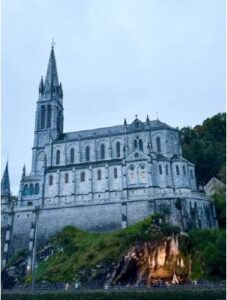
Lourdes ©Julia-Laura Schulz
For my return journey, my family picked me up, and we drove back via Lourdes and Paris. The Rosary procession and the water ritual formed a meaningful and memorable conclusion to my internship.
5. Conclusion
In conclusion, I can confidently say that the last rotation of my internship abroad was a complete success. I learned not only a lot professionally and linguistically but also gained numerous experiences, impressions, and valuable contacts. Montpellier taught me so much, and this experience will stay with me forever. Therefore, I would like to sincerely thank the Erasmus+ internship program for their support, which, along with my family’s assistance, made this stay possible. If you have any further questions, I am happy to help. Thank you!
My Erasmus Traineeship in Valladolid
- Medicine
- Spain, Valladolid
- Universidad de Valladolid
- 01/2024 – 06/2024
My name is Felix and I’m a medicine student from Aachen, Germany. This year I spent 6 month of my practical year taking part in a hospital Internship at the University of Valladolid in Spain.
Preparation
As for the preparation I first reached out about a year before my stay to the Erasmus coordinator and the dean of the Faculty of Medicine at the university. Although sometimes hard to reach, he will eventually answer you and help you with whatever request you might have. He recommended me to contact two other doctors to organise the different parts of my internship. Eventually I organized my stays with the respective heads of the different departments and presented my final rotation in internal medicine and surgery to these two doctors to get their confirmation.
Arrival and Organisation
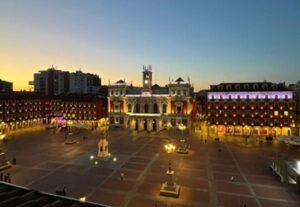
©Jan-Felix Wolters
I arrived 1 week prior to the start of my internship, which gave me time to visit the international office and organize the formalities. Although I could not be matriculated without taking any assignments, they were very helpful and worked out a way to provide me with the student badge. That way I could take part in the university sport and other programs, such as the GUM, which is a group of students and other people that go on hikes every 2nd Sunday throughout the entire year. In order to get set up for the hospital, I had to go to the Dean’s office, where the friendly employees helped me go through the process of registering for my internship, which included receiving my nametag and clothes for the hospital. For this process a “Certificado de los delitos sexuales” is necessary. This was very easy to get at the local state’s office. I got a date within 3 days and it only took them 1-2 days to get the necessary information from Germany and to send me the certificate via email. All in all the people were always very friendly and helpful which made the process easy, even though some things couldn’t be resolved right away.
Accommodation
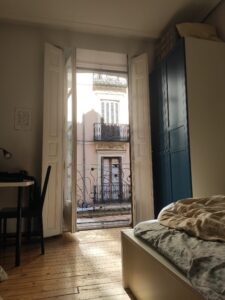
©Jan-Felix Wolters
Accommodations in Valladolid are surprisingly cheap and easy to find. Rooms in a shared flat generally range between 180 and 350€. Studios aren’t much more expensive either. The main website used is Idealista, but you can also find rooms through facebook (watch out for scammers). I wanted to get to know people which is why I was looking for a flatshare. After only about 3 days of search I found a very nice room in a central apartment right next to the main shopping street. Although not very good equipped and a bit lived through, the apartment was very nice and that way I got to know other international people. It is worth to mention that in Valladolid (and other Spanish cities from what I’ve heard) it’s common for landlords to take away money from your bond, or even the whole bond without indicating a reason. It seems to be a way of making extra money off international students, who usually can’t do much about it. After this happened to some of my roommates as well, I decided to not pay my last months rent and leave the bond to the landlord, which is a common strategy.
The City
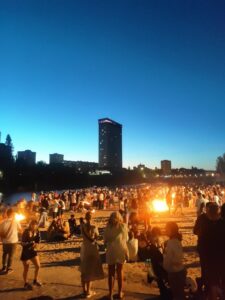
©Jan-Felix Wolters
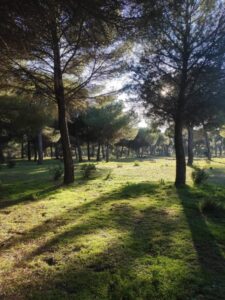
©Jan-Felix Wolters
Valladolid wouldn’t have been the city of my choice if it weren’t for my girlfriend, who is from there. My expectations weren’t very high, and got easily excelled by this mid-sized city in central Spain. It has a beautiful historic centre and even an artificial beach at the riverside. Located about 1 hour from Madrid by train and 2.5 hours from the north coast by car, the city is particularly well located in Spain. It gives you the possibility to regularly visit the capital or to rent a car for a cheap price and spend the weekend at the sea, surfing or enjoying the incredible nature of the north. What is more, it is surrounded by the beautiful and historic cities of Castilla y León, such as Salamanca, Segovia, Burgos and León, which are all worth a visit. Being the capital of its region is what makes Valladolid a very attractive city. While the weekdays are rather calm, on the weekends it attracts plenty of people from all around. This leads to the city offering a large variety of activities, sports, restaurants, bars and results in a high quality of living. The city hosts many events throughout the year, including regular and free public concerts on the Plaza Mayor, theatre and music festivals and the famous San Juan in June, where everyone goes to the beach to enjoy the longest night of the year at a bonfire. Valladolid also offers beautiful parks and an immense amount of terraces, where you can find some of the best and cheapest tapas in all of Spain. Drinks and food are extraordinarily cheap, which allows you to spend a big amount of your time outside, enjoying the Spanish way of living. Personally, I loved that it’s very easy to leave the city by bike or bus and be in the nature in the blink of an eye. It is also worth to mention, that the Spanish in Castilla y León is considered the clearest and easiest to understand in all of Spain.
The Hospital
I spent 2 months of my Internal Medicine internship at the Hospital Río Hortega and my 4 months of surgical internship at the Hospital Clínico. I can recommend both hospitals. While Río Hortega is a very modern and well equipped hospital located outside the city centre (12-15 minutes by bike), Clínico is located right in the heart of Valladolid, next to the Faculty of Medicine and has a nice and familiar touch to it. Generally it is important to say, that Spanish medicine students don’t get to participate in the daily hospital work near as much as German students. The working hours are from 8am to 3pm, but the doctors might leave earlier when the daily ward round and the examination of the patients are done. In Internal Medicine, the tasks are limited to following your assigned doctor and examining the patients. The doctors are generally very open and willing to explain you everything. There is no time pressure which leaves plenty of time to explain diseases and procedures. But the low patient flow also leads to a lower input compared to other countries. The emergency department was the only department where I got to assess my own patients and right down the anamnesis and reports before discussing the procedures with the doctors. In the surgery departments the Spanish students rarely take part in the surgeries. I was lucky to get to know a couple of doctors who would regularly let me take part in surgeries and perform assisting tasks like holding hooks, unscrewing screws or sew a few stitches. Although I definitely learned new things it was probably less compared to spending the same amount of time in a German hospital.
Conclusion
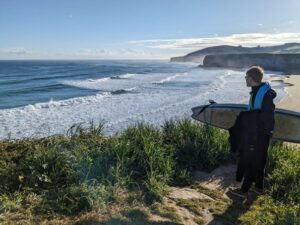
©Jan-Felix Wolters
I had a great time throughout my stay in Valladolid and am very happy to have gotten to know the country, the city and the people. Valladolid is a beautiful city and has much more to offer than one would expect at first glance. It may not be able to compete with Spains major cities when it comes to the cultural offer and nightlife but impresses with a high quality of life, easy access to the nature and a cheap cost of living.
My practical year in St. Johann in Tirol, Austria
- Medicine
- Austria, St. Johann in Tirol
- Bezirkskrankenhaus St. Johann in Tirol, department of “Allgemein- und Viszeralchirurgie”
- 11/2022 – 01/2023
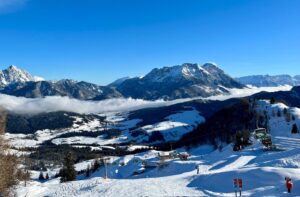
© Angela Kurz
Preparation
I applied around ten months before the start of the Practical Year (called Praktisches Jahr (PJ) in Germany or Klinisch Praktisches Jahr (KPJ) in Austria). However, most places at the hospital “Bezirkskrankenhaus St. Johann in Tirol” are already taken one and a half to two years in advance, so it makes sense to call first and ask if there are still places available. The contact person is the “Sekretariat Ärztliche Direktion”, whose contact details can be found on the hospital’s website. They will also tell you which documents you need for the application. The hospital is a teaching hospital of the Universities of Innsbruck and Vienna. I would recommend contacting Ms. Lemos, the coordinator for study abroad of the medical faculty of the RWTH Aachen University, in time for necessary formalities.
Accommodation
There is a house right next to the hospital where students who are interns at the hospital can stay for free. Each student has their own room and bathroom. The kitchen is shared and is a great meeting place for communal meals and game nights. You also get free breakfast, lunch, and dinner from the hospital. However, the number of rooms is limited, so you should register for this in time. Since there wasn’t a room available at first, I lived in an apartment in the neighbouring town for the first two weeks. Then I was able to move into the student house for the remaining time. I would recommend checking regularly with the secretary’s office, as there are often vacancies in the house at short notice. I found support in finding a private apartment at the secretary of the hospital and the tourism association (Tourismusverband St. Johann in Tirol), each of which sent me a list of contact details of private landlords via e-mail.
Traineeship
On the first day of my internship, I had some organisational tasks to do: I reported to the secretary’s office, received work clothes, a staff ID card, and keys. Then I introduced myself to the surgical department. The working day began daily at 7.15 a.m. with the morning meeting. Afterwards, we medical students took some blood samples on the ward or assisted in the operating theatre. The rest of the time we accompanied the doctors in the surgical outpatient department. The day ended around 4 pm after the X-ray discussion and the ward rounds – on Fridays, usually a little earlier. As a medical student at the hospital in St. Johann, you do two night shifts a month, one during the week from 4 pm until the next morning and one on the weekend. The tasks include taking blood samples, setting up intravenous lines and assisting in the operating theatre if necessary or helping in the emergency room. I would recommend rotating also to orthopaedics/trauma surgery as part of the surgical tertial if possible.
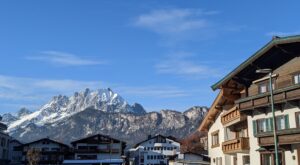
© Angela Kurz
Free time
The region around St. Johann in Tirol is situated in the middle of the mountains and offers many great leisure opportunities. There are many ski resorts nearby, e.g. St. Johann itself, Kitzbühel, Saalbach/Hinterglemm or Ellmau/Scheffau. In some of them you even get a discount with your employee ID card! In other seasons, of course, there are also wonderful hikes to be done. The cities of Kitzbühel, Innsbruck and Salzburg are also not far away. In December, the Kitzbühel Christmas Market is definitely worth a visit!
Conclusion
I really enjoyed my time in St. Johann in Tirol and can recommend a PJ tertial in this great area. I made many new friends, and we made great memories together in the hospital and during our weekends in the mountains.
My practical year in France
- Staatsexamen, Medizin
- Rouen, France
- Hôpital Charles-Nicolle de Rouen
- May 2022 – September 2022
Preparation
The preparation began about a year before I started my Practical year (Praktisches Jahr- PJ). For the registration and application, I contacted Ms. Watteel directly, who is responsible for Erasmus stays at Université de Rouen Normandie. She was my contact person during the entire Erasmus stay and took care of all formal requirements and certificates in a timely manner.
Housing
Accommodation can be found at leboncoin.fr (something like Ebay in Germany) or Facebook. There is also the possibility to apply for student residences, but I did not do this. Furthermore, there are many real estate companies in Rouen that rent both furnished and unfurnished apartments. It should be noted that if the apartment is rented through a company, a fee of approximately one month’s rent must be paid. For students, the right side of the city is warmly recommended, because most of the activities and parties are on this side of the city. There are good bus connections to other parts of the city, but they are very limited at night. The university hospital is located almost in the city center and is easily accessible by public transportation.
Job and everyday life
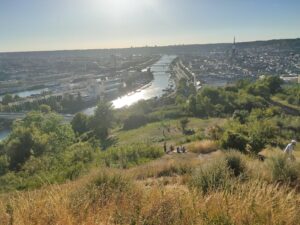
© Lara Gubeljak
I completed a PJ tertial in the clinic for general surgery (chirurgie digestive). There I was in the OR every day and was allowed to assist most of the time, be it directly on the patient or administering the instruments. There were many opportunities for me to actively participate. I found it very good that I was allowed to sew up, that I could participate in organ donations, and that I was also able to perform some tasks beyond the student tasks. A normal day started at 7:30 a.m. and ended between 4:00 p.m. and 6:30 p.m. The visceral surgery team was very nice and had a lot of patience, especially when I occasionally didn’t understand things because of the language barrier. There were some doctors who also explained things in English, although this is not the rule in France.
For the internship, you get a reimbursement of about 250€ per month, but you must check with the HR department often and have a French bank account. All students who are currently doing their internship in a surgical department share the 24 hour duties among themselves. These services are additionally paid but are not obligatory for exchange students. During the night duty you have to do instrumentation and assist in the OR. You get your own room with your own DECT phone. If you are lucky and there are no emergencies, you may (and should!) sleep.
Leisure
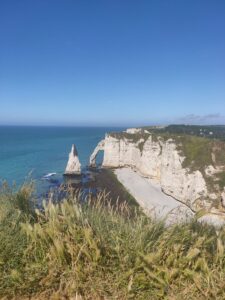
© Lara Gubeljak
I was very fortunate to have a large circle of friends in Rouen, which made the stay overall very social and gave a different perspective to the busy PJ. It is very common to end the evening in a bar or café, although it must be said that due to the early working hours this was often not possible. Rouen is a student city and there is always something going on. In summer there are concerts every Thursday, there is the daily Cathederal de Lumiere, which was exciting every time again. It is a beautiful city from the Middle Ages, so there is a lot of history to see. The numerous museums are free until the age of 26. The surrounding cities like Paris, Le Havre, Étretat or Vernon are very worth seeing and easy to reach by train.
Conclusion
Rouen should and can definitely be recommended for tourism as well as for the PJ. I learned a lot there, was able to do a lot of practical work and strengthened many social skills in the professional setting. The beginning of the PJ was very exhausting, because a lot of things happened very quickly in the hospital and the medical terminology is clearly different, plus it contains many abbreviations. It was a great opportunity to deepen my French and to get an insight into general surgery. Four months were enough to settle in well and to get a little insight into the rest of Normandy.

